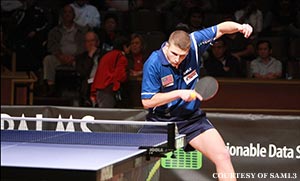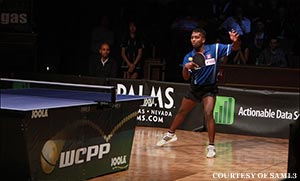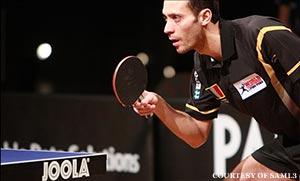Back in the days when Sinatra and the Rat Pack ruled Vegas, world-class table tennis was simply a better version of the kind of pingpong you still play in your garage, frat house or dive bar.
It was fast and frenetic and a whole lot of fun, requiring those cherished Sin City traits of lightning reactions, split-second decision-making and steely nerve. Rallies were long, fierce tests of mind and body and provided a constant stream of entertainment.

Then technology happened.
By the 1980s table tennis equipment manufacturers had developed high fraction rubber-coverings, carbon-fiber blades and special glues that artificially enhanced the velocity and spin a player could impart upon the ball.
Table tennis got high-tech and with a flourish of a scientist’s test tube, murdered itself as a spectator sport. The extra pace and rotation on the ball meant rallies shortened and become a dull imitator of the previous thrills and spills.
An Olympic event since 1988, table tennis may be the most complicated and technical of all games. Trust me. I misspent a youth trying to master it, a daily ritual of training and conditioning that helped me improve enough to win the Australian Open junior title in 1996. But I was still well shy of top senior level, where only an elite few can hope to earn more than even an average minor league baseball player. At 19 I gave it up, deciding that journalism school and chasing girls was a better investment of my time.
Table tennis has a beauty of sorts, needing the mind of a mathematician and the athleticism of a running back. For a player, at any level above the rank beginner or garage hack, it is intricate and beguiling.
But its complication is its greatest downfall. When the public tunes in for the Olympics, they don’t understand that a fluffed smash from a world champion is probably the result of an opponent’s devilish sleight of hand rather than his own lack of focus.
The key is in the spin, but table tennis’ secret is an invisible one, understood by few. Outside of China, which has won 20 out of 24 gold medals since table tennis became an Olympic sport, much of the world turns a blind eye. In Beijing in 2008, NBC’s table tennis coverage was primarily restricted to its online platform.
It was time for a change. It was time for the World Championship of Ping Pong.
Jeff Bogatin, a serial entrepreneur, venture capitalist and technology tycoon from Florida, had the idea first. Bogatin has loved table tennis for many years but despaired at how it had fallen so far from the public radar. During a quiet moment he dreamed up the concept of a pingpong tournament using modern players, old style equipment and trying to win over a whole new audience.
“I likened it to motor sports,” said Bogatin, a man with the kind of winning smile reserved for successful businessmen. “So often the winner is the guy who has the fastest car. I hate that. I wanted to level the playing field, give everyone the same equipment and see where it took us. We decided on sandpaper-covered paddles, to take the game back to its roots.”
Bogatin drafted in old friend Barry Hearn, a bombastic, highly-opinionated British sports promoter. Hearn is the magician of marginal sports, having turned darts from a pub activity into a sport played for million dollar prize pools, watched by millions of European television viewers and now pushing for Olympic recognition.

Hearn helped hook him up with Fox Sports, which agreed to broadcast a series of shows internationally, while Bogatin stumped up $100,000 in prize money, booked the Pearl Theater at the Palms and recruited players representing 16 nations to take part.
With a week to go before launch, all was going to plan. The players would square off in a straight knockout tournament for the bulk of the prize pool, then do battle in a team competition known as the Marco Polo Cup on the second and final day. Specially developed paddles just like those of yesteryear had been developed and couriered to the participants to practice with. A few clever innovations -- like a two-point ball that would help trailing players narrow the gap -- were devised.
Then came a hiccup, one loud enough to be heard all the way from Switzerland, and the headquarters of table tennis’ governing body.
The International Table Tennis Federation is not the most arcane of the world’s sporting bodies but it’s fair to say that it isn’t the most enlightened either. And it didn’t like the World Championship of Ping Pong, not one bit.
Never mind that the Fox platform would take the event into an estimated 800 million homes around the world. The governing body, with its headquarters in Lausanne, felt the threat of the upstart event and tried to make it go away.
With days to go before the tournament, with players flights locked in and everything a backhand slice away from being ready, the ITTF issued a snooty statement. It threatened to ban any of its players from participating in future official tournaments if they participated in an event like the WCPP that didn’t have its authority.
So there was a decision to be made, and a difficult one. Exclusion from the ITTF could be catastrophic for the players but while $100,000 might be chump change for the stars of the NFL even in these deadlocked times, for these guys it was serious cash.
Enough to invest time learning to play with new equipment, even if it meant screwing up your regular table tennis game. And enough to risk seriously irking your governing body.
In the end, it came down to the wire and the ITTF was eventually appeased when the tournament removed the words "world" and "championship" from its title. A last minute change to International Classic Ping Pong sorted out the suits in Switzerland, and hostilities on the table could commence.
Maxim Shmyrev had barely slept for 72 hours yet stood seconds away from $41,000. The 38-year-old Russian, a 20-year veteran of some of Europe’s toughest leagues, had turned up in Vegas just a few hours before his first match, thanks to monumental hold-up that sabotaged his flight connections from Moscow.
Jetlagged and weary, Shmyrev had to survive match points in his opening round against American Trevor Runyan, before scraping through in a thrilling deciding set. After two more victories he now faced the Philippines’ Ernesto Ebuen, and was one point away from becoming world champion. And he was smiling.

“But look at his hands,” whispered Australian champion and two-time Olympian William Henzell, sat next to me in the audience. Henzell is one of my closest friends, having been a teammate on the Australian junior team about a million years ago. We’ve both achieved our goals in our respective fields, he is a multi-national champion, I get paid to travel to World Cups, Olympic Games and boxing’s biggest title fights.
We have common interests and spirited discussions and rely on each other for advice. Yet despite building a successful coaching and table tennis website business to supplement his tournament earnings, his income from playing a sport is still dwarfed by the salary I receive for writing about it, a fact that irks me more than it does him.
As usual he was right. Shmyrev’s face spoke of calm and confidence but his hands were shaking and he was battling to keep them under control. Ebuen didn’t notice. “I’ve never seen that from (Shmyrev) before,” said Henzell. “He is normally like ice, but that’s what all that money can do to you, to any of us. It doesn’t sound like a fortune but for a table tennis player it can change your life, for a while at least.”
As Shmyrev collected himself the crowd in the Palms burst into a final burst of animation, whipped into a mini-frenzy by lively MC Adam Bobrow, a pingpong playing actor, comedian and club host from Los Angeles. Bobrow had done a good job keeping the atmosphere up tempo, flirting and joking with a crowd that was an extraordinary collection of strippers, drunks, off-duty gamblers and genuine fans of pingpong.
Shaking hands or not, Maxim Shmyrev wasn’t about to let all that cash slip through his fingers. Moscow is a city of haves and have-nots and $41,000 can elevate a man and his family into a different social strata. Perhaps it was the thought of a fancy new wardrobe -– he would drop a hundreds at a Ralph Lauren outlet store the following day -– that calmed his nerves, but he finished off Ebuen after one more tense rally and raised his arms in triumph.
The WCPP had its first superstar. Now it was about to get a dose of Hollywood.
You’ve seen Adoni Maropis before and he probably scared you witless. Even if the name is not familiar, the face will be to anyone who has watched much popular television over the past few years.
Maropis has made a successful career out of being, well, a not particularly nice guy. In "24" he tortured Jack Bauer and tried to detonate nuclear bombs on American soil as terrorist Abu Fayed. In "Criminal Minds" he was a chillingly evil serial killer called Ben Abner, who wreaked havoc upon New York City.
Maropis is, in actual fact, a very nice guy. And he is a pingpong player. Indeed, the 47-year-old believes the game saved him from acting mediocrity and turned around his life.
“I was kind of down and out and getting nowhere in my career a few years back,” he told me, after we’d smashed balls at each other for half an hour. “I decided to give it one last shot and to try to find positive influences in my life. I remember playing pingpong as a kid and the joy it brought me so I decided to recreate that. I got a table, started playing all the time, and good things began to happen.”
Maropis has also become a darn fine player, and this tournament could have been made for him as he ordinarily uses a "hard bat" -- a paddle similar to the kind used in the WCPP and unfamiliar to the pros. His lack of international credentials meant he was not picked for the 16-man singles event, but did earn inclusion in the Rumble, a team competition on the final day, which was basically a simplified form of winner-stays-on. Playing on the World team Maropis was a revelation, winning seven points while losing just three, and helping his side clinch the Marco Polo Cup.
But an actor playing against some of the world’s best players? Was the WCPP a gimmick?
In some ways it was, but that is not to insult it. The World Series of Poker was derided as a gimmick before spreading into an event watched in more than 150 countries and the WCPP would happily take even a 10th of that kind of success.
The players were characters, but they were regular guys too, chasing a dream and a paycheck all the way into the Nevada desert. Hours after the tournament they descended into the Vegas night en masse, drinking beers, swapping stories and throwing some drunken game at a pretty girl in a yellow dress.
Next week they would be back to their respective countries and club teams, playing with high-tech paddles in front of no cameras, few fans and for a pittance. That is the life they chose, but the WCPP was a treat they deserved; to earn some money, to get a little face time.
Word is the WCPP will be back next year and let’s hope so. Because sometimes progress has to look to the past before it can move to the future. Sometimes it is nice when technology takes a backseat and sports can be simple.
And when the guys on TV play the exact same game you do, only better.
-- Martin Rogers once beat a man in pingpong using the back of his BlackBerry. He can be reached at mrogerssport@yahoo.co.uk.




